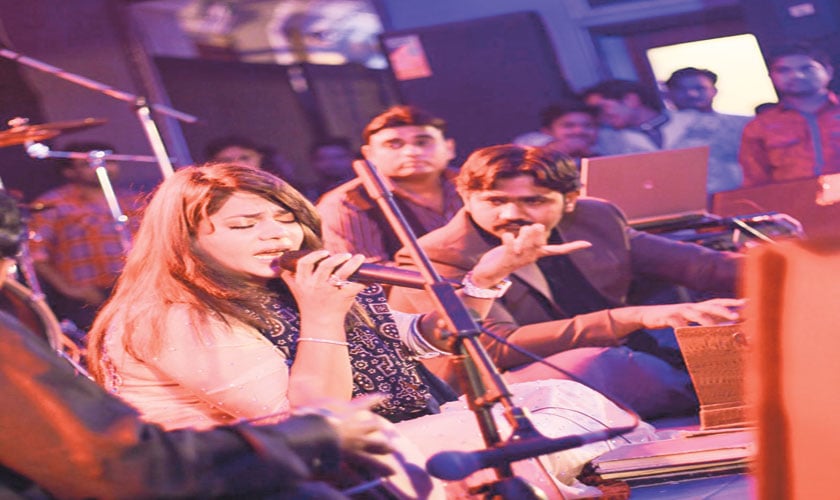Enchanting singer of sufi kalaams, who is known for presenting a thoughtful blend of South Asian folk and mysticism, Sanam Marvi has done a great job in taking Pakistani music to foreign shores.
Currently touring the United States, the singer accompanied by Arieb Azhar, talks about the message of Sufi poetry in this age of disruption and disconnect.
Enchanting singer of sufi kalaams, who is known for presenting a thoughtful blend of South Asian folk and mysticism, Sanam Marvi has done a great job in taking Pakistani music to foreign shores. Having appeared on Coke Studio on multiple occasions, Marvi’s ability as a singer is well-known and deeply cherished.
Joined by Arieb Azhar, another marvelous musician from Pakistan, Marvi is currently touring the United States, which is backed by Center Stage and is part of a cultural exchange program initiated by the U.S. State Dept. From the reviews coming on social media, it seems that she is as impressive abroad as she is at home.
As part of the tour, Marvi has played at the Jorgensen Center for the Arts in Connecticut, the Sanders Theatre in Cambridge, Massachusetts as well as at Harvard University and other places like New York and the Savannah Music Festival. In between playing her glorious blend of kalaams, Marvi, translated by Azhar, spoke to Connect Savannah about the message of Sufi poetry in this age of disruption and disconnect.
When asked how an English-speaking audience could connect with her work, Marvi stated: “Music is a language by itself. It doesn’t have a specific language. I hope to get a message of the Sufi poetry which I interpret and I hope that happens and the audience appreciates it.”
Speaking about growing up with music and learning from her father, Marvi observed, “When I started learning from my father at the age of seven, I had no inkling that I was going to do this professionally. I was just learning from him and enjoyed that. I found it interesting what he was teaching me. At a certain point, I began to realize the importance of what I was doing and the need to take it out of the area where I hail from. This message is too big to be contained in one province; it concerns all of humanity. It’s not connected with any one religion. It needs to go global.”

Marvi, a student of Sufi tradition, also shed a light on how it formed her career. She said: “I grew up learning poetry of the great Sufi poet Shah Abdul Latif Bhittai, who is very, very famous from that part of Pakistan. Not only did he write a lot of beautiful Sufi poetry and ancient folk tales, but he also put those poetry into tune...poetry of this scale has a maximum effect on the listener. The connection between music and poetry in Sufi poetry is very strong.”
Speaking about the increasing “popularity of Sufi music”, Marvi pointed to Coke Studio and explained how it proved to be a catalyst. “A lot of credit is due to [Pakistani music television series] Coke Studio, because it brought the folk music out of Pakistan and introduced it to a new generation. A lot of credit goes to them.”
Reflecting on the same question, Azhar added: “The reason it became so successful was because there was already a thirst for this type of knowledge. I feel that in Pakistan there was a need of people to connect with something deeper than they were taught to identify. This tradition connects us beyond borders and connects with our roots, our history, and other religions. We are getting ready to do another season of Coke Studio and rehearsing the songs over the next couple of days.”
When asked what they (Marvi/Azhar) would like the audience to know before they experienced their performance, Azhar explained: “Sanam hopes the audience will enjoy the poetry she’s going to be singing and that the message of the poetry is properly conveyed. And that’s why I’m here; my job is to make sure the people also understand and are appreciating the musical quality of the whole thing and intention behind the music, but also get to enjoy the lyrical aspect.”
– With information from ConnectSavannah